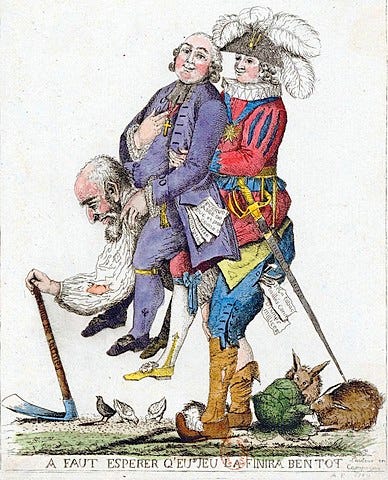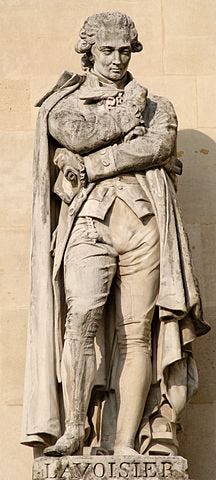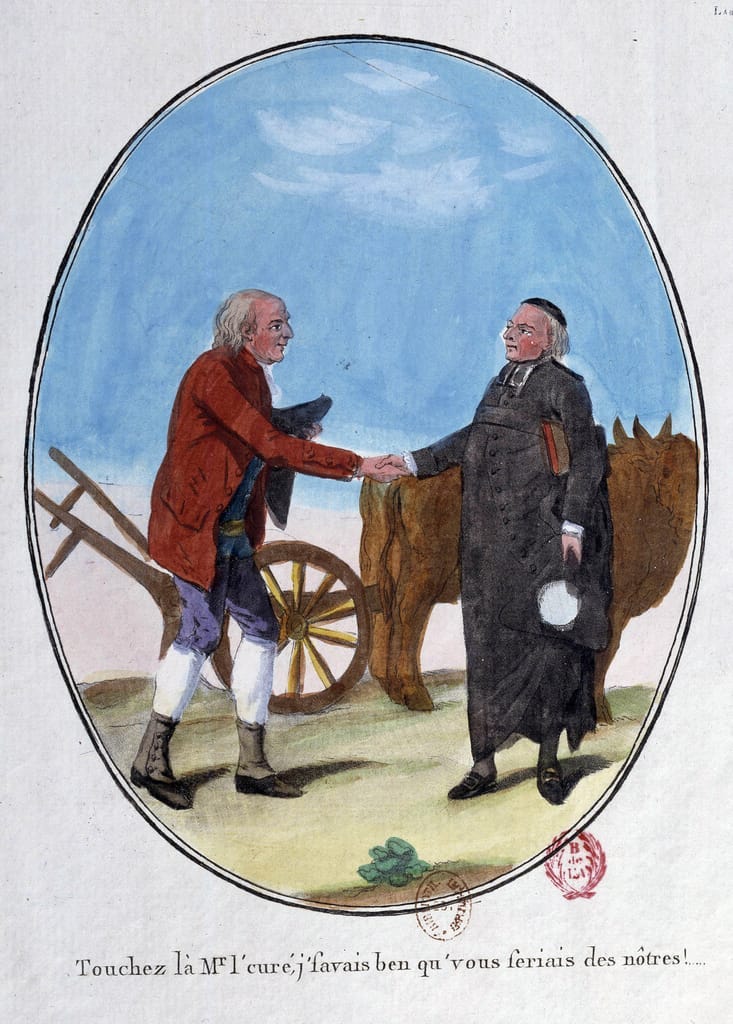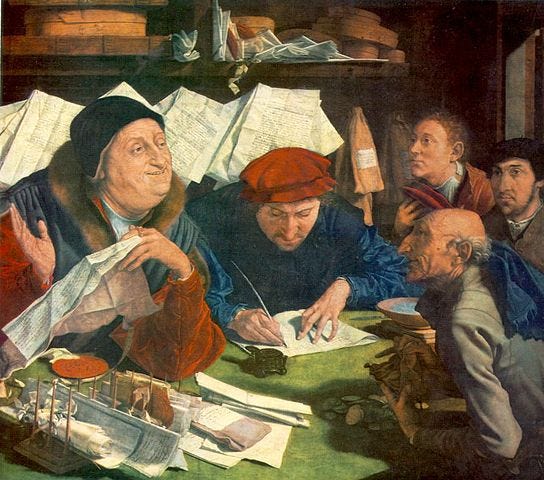Of Chemistry and Office: A (Brief) Genealogy of Power, Part Two
Quid ex Machina, Section 3 of Act II Scene 3. Theme song by Édith Piaf
Welcome! 😄I’m Helen and here I write about the fortunes that come from the Earth: geography, medieval farming, music, time, and the Unseen.
This is a new essay of the series Quid ex Machina, about the Unseen impact of AI (and more broadly, technology) on our societies. Here’s the rest of the series .
Today’s theme song is Ça ira, iconic of the French Revolution, sung by Édith Piaf.
[Getting to ~1,500 words from ~8,000 words was a lot harder than I had thought…If one day I publish a book, I’ll add back the historical anecdotes, literary references, and side discussions. One day.]
“Nature created neither servant nor master;
I want neither to give nor receive laws.”
And its hands would weave the entrails of the priest,
For the lack of a cord with which to strangle kings.(Denis Diderot, Les Éleuthéromanes, public domain. Translation by the author)
In the last essay, we saw how software governs our lives. We also saw that in the old days, the king ruled but did not govern, and he relied on local parish churches and outsourced agents – until the Industrial Revolution. Yet, he as an earthly ruler still had to claim divine favor as the root of his legitimacy and authority to give laws. For the earthly to take over from the supernatural, it took a lot more than steam motors, textile mills, and merchant trading.
As the life of a French chemist would show.
The Deadly Side Hustle
It is a truth universally acknowledged, that a young nobleman doing chemistry research in 18th-century Paris, must take up tax collection as a side hustle.
Antoine Lavoisier was born and raised in Paris, became rich by birth, and became a chemist by choice. His accomplishments are too long to enumerate:
He identified the elements Oxygen and Hydrogen, and named them so.
He predicted the existence of Silicon as an element – 50 years before it was identified.
He investigated gunpowder’s effect on air quality, and made serious proposals to improve public sanitation and water quality.
…
By the old age of 26, Antoine was already elected to France’s Academy of Sciences.
I said “old” on purpose. Because at 26, he already passed the halfway point in life. His research — combustion, list of elements, and the metric system — powered the industrial revolution, but he did not live long enough to see its full glory.

In his main gig as a chemist, Antoine was liked and respected. In his side hustle, as an outsourced tax collector for the King of France to grab money from traders, farmers, craftsmen, and other commoners, Antoine and his colleagues were widely hated. Like the greedy landlord in the last essay, they marked up official tax rates and fleeced taxpayers. What’s more, they made secret contracts among themselves, and employed violent collectors to get payment one way or the other. Worse yet, the nobility who owned lots of land and money were exempt from taxes. The Catholic Church, whose parishes governed local lives from birth to death, also enjoyed perks – such as tax exemptions. So if you were a commoner in the French ancien régime (old order), and you didn’t pay up the heavy taxes on your tiny earnings, you’d risk being beaten up and losing everything.
By all accounts, Antoine Lavoisier was a decent and compassionate man; but he actively played in an eff-ed up system — even by 18th-century standards. The majority of French commoners were fed up with the heavy taxes and unfair perks, yet more problems slammed them head-on: high food prices but no food, lots of people but no jobs, lots of debt but no money...One thing snowballed into another, like a runaway truck heading down a steep hill, and in 1789, erupted into the French Revolution – as we know it now.

The French Revolution was a vast and complex web of events, ideas, chances, and personalities. I won’t even try to scratch the surface here. But its key idea was clear: getting rid of the ancien régime that failed so many commoners. This meant that two big things must be done: one, abolishing the outsourced tax collectors; two, removing the Church from people’s lives1.
And so it began.
In 1789, church property was confiscated and sold, and monasteries closed.
In 1790, local parishes no longer cared for the poor, sick, elderly, and orphaned – because the French state took over this responsibility. Clergy was ordered to swear loyalty to the French Civil Constitution, and the Church was made a subordinate of the French state.
In 1791, outsourced tax collectors and their society were abolished.
In 1792, Louis XVI, once the divine-favored king of France, was stripped of all his supposedly sacred rights and titles.
In 1793, the National Convention debated tax reforms, and set up a tax agency that would answer directly to the French state.
Also in 1793, Antoine was arrested, and charged with fraud.

By then, Antoine was 50 years old. In the same year, Louis XVI and his queen were beheaded, and several revolutionary leaders were purged or assassinated. The truck of revolution was hitting bumps and blocks, spilling ideals and blood all the way.
Antoine made an appeal for his life, so that he could continue his chemistry research.
The appeal was denied – after all, Antoine had been an active tax collector for the beheaded king, what other injustices would he do, if he got out of jail free?
Thus, on a guillotine in Paris, the life of Antoine Lavoisier ended, on May 8th, 1794. This past Monday was the 229th death anniversary for this chemist of renown, man of science, and — tax agent. He was born into the old world, where the king’s words were law, local churches ran people’s lives, and tax collection was outsourced. At his death, he saw that popular majority representatives started making laws, the French state began directly collecting taxes, and assumed duties of local churches. What he lived through, was an era of most drastic changes in both technology and society.
From Altar to Office
Quick recap: the French Revolution removed the church from civic lives high and low. The head of state, be a king or emperor, was no longer a God-appointed ruler. Instead, he became embodiment of the nation, and must enjoy popular support. For regular folks, instead of relying on local churches for birth registration, marriage licenses, property records, dispute settlements, and death certificates, they turned to the French state and its local offices. What the church had done for many centuries, the state was now doing it all.
There was only one problem. The parish church governed its local area, because it had the up-to-date local information and local clergy who acted with that information. The Industrial Revolution made information travel a lot faster, so a king or a high-level minister could make a detailed decision of governance, but they still needed boots on the ground to carry out that decision. The French Revolution kicked the clergy out of the picture, so someone had to fill this void of local staffing.
Enter the civil services.
Looking into the history of civil services and industrialization in different regions, I discovered a pattern: industrial expansion almost always coincided with the expansion of civil services.
British civil services started to boom in the mid-18th century, when steam motors and Spinning Jennys started producing massive quantities of goods.
French civil services began to grow, in the late 18th and early 19th century, when Napoleon dialed up productions for his military campaigns.
In the Flemish region (Belgium and the Netherlands) where early industrialization and trading bloomed, professional tax collectors and notaries, who were employed by the governor’s office, appeared as early as the 17th century.
The US federal civil service was set up in 1871, just as the US began pumping out lots of locomotives, electricity, and steel.
I think this correlation reveals a causation. Local parishes had an edge in timely local information, but the industrial revolution blunted the edge. Meanwhile, population boomed, people moved around a lot more, lives grew more complicated than pre-Industrial times...Governing people’s lives became too much work and too hard for the priests, so anyhow, they had to cede their turf to professional civil servants. What one or two priests had done for an entire town, was parceled out to many specialists: one handles birth registration, another deals with death certificates, a third issues marriage licenses, a fourth titles your vehicles, a fifth tracks demographics in town, a sixth gets you low-income assistance...
In time, each specialty received its own laws. Unlike pre-Industrial times when these laws varied widely from one place to another, they were now uniform across the nation. The highest laws of the land, proclaimed by the king (or his high ministers, or popular assembly) were no longer disregarded in far-off towns and villages. Eventually, local civil servants will develop their own petty rules to cope with the local quirks – but at least they have to follow the higher laws, and can’t make up random rules on a whim as if they still lived in pre-Industrial time.

At this stage, the powershift from the gods to the kings was completed. From the top, earthly law-makers called on popular support as the source of their legitimacy and authority. On the ground, civil services governed local lives, and are subordinate to higher laws of the land. In the eyes of sociologist Max Weber, this governance structure is a must-have in industrialized nations. It’s formal, it holds standards, and it runs big organizations — like a vast nation – with rational, specialized knowledge that made the industrial revolutions possible in the first place.
Weber knew what he was talking about. He was born into an agrarian, fractured German state in the mid-19th century, witnessed Germany’s unification, and later its rapid rise to a full industrial power in the early 20th century.
Seeing through Weber’s lens, we can better understand how the power of law-giving shifted again: this time from the kings and their civil servants, to software and its makers. Spoiler alert: in the early 1900s, the structure of civil services has been copied by big companies, factories, and other institutions.
In the next essay in this genealogy of power, we’ll step into the world of software, and find out what it is really about.
Thank you for reading Earthly Fortunes! Like it? Please share it! 😄 Subscribe for more earthly fortunes: geography, music, time, medieval farming, and the Unseen.
I’d love to hear your thoughts! Comment below, DM me on Twitter or Instagram, or reply to the email! Anything you send, I’ll read 😄
Some of the most ardent revolutionary leaders were Catholic priests.





The story of Lavoisier and the impact of technology on governance structures was really thought-provoking. you're so good at seamlessly connecting these fascinating tales of history with our current landscape. You're a wealth of historical anecdotes! Love your perspective on how software is shaping power dynamics. Keep up the great work Helen ~ Gonna go back and read some of your previous pieces!
Yet another juicy episode of this great series. And while you're guiding us through the historical evolution of the world of software, you're becoming my personal history teacher. Thank you, Helen, for another awesome piece. :)